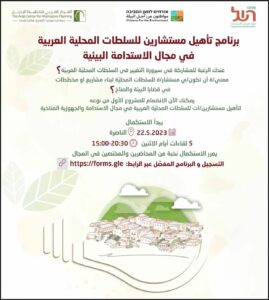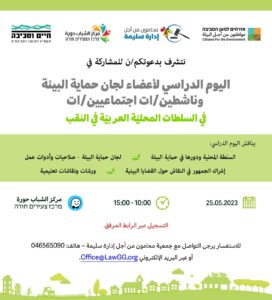Executive Summary and Recommendations
March 2011
Industrial Silence – Report No. 2
Executive Summary and Recommendations
This is the second in a series of reports on “Industrial Silence” published by Citizens for the Environment in the Galilee (CFE), a nonprofit organization which aims to promote sustainable industrial practices in Israel.
Please view the first report, Industrial Silence 1, that was published in March 2010 & the Compliation Reports 1 and 2 from 2007-2011
The reports set out to examine two central issues
Do the industries surveyed meet environmental standards as stipulated by law? And are the requirements and standards up to par with internationally accepted regulations?
Does the frequency of surveillance conducted by the authorities—who are responsible for surveying industrial conduct—meet stipulations determined by law?
Report No. 1 surveyed 24 factories and one hospital in the western Galilee. The current report surveys 19 additional factories in the same area, one hospital and two wastewater purification plants.
Major Findings
Most factories in the north do not comply with the terms stipulated in their business licenses, neither with regard to air quality nor with regard to effluent. This means that factories are basically non-compliant—they do not carry out surveys according to the frequencies required, and they do not report to the supervising authorities as necessary.
Standards for the prevention of air pollution have not yet been adapted to modern requirements in many of the factories surveyed. A few of them have never instituted air-pollution prevention standards.
While compliance with effluent quality standards is more prevalent, the methods used to treat industrial effluent in Israel is different from the internationally recommended BAT—Best Available Technology. The standard European BAT recommends treating effluent on the premises of the factory, and not in a regional wastewater treatment plant. This, in addition to the overall lack of compliance among industries in the north, is one of the main reasons for wastewater treatment plant malfunctions. As a result, poor quality effluent is used widely, and sometimes raw sewage flows directly into the sea and nearby rivers.
Considerable improvement has occurred during the past year with regard to the publication of information, and to a great extent due to efforts made by the Ministry of Environment. However, despite the improvement, most of the cities in the area, including local as well as national authorities, even municipal environmental protection units, do not implement the provisions stipulated by the Environmental Information Law. Residents who seek information about factories situated close to their residential areas, can, at this point, only refer to the website of the Ministry of the Environment, where they can find relevant information, although partial in most cases, and mainly with reference to emissions only.
Another important improvement refers to general industrial behavior which is more inclined nowadays to consider environmental protection in their practices. This is evident both in terms of investment, as well as in the treatment of emission level deviations. It is also reflected in the current readiness to disclose information to public institutions such as CFE.
There is no mechanism for systematic and accurate data collection for the supervision and control of industrial practices which is governed by regulations stipulated in business licenses. There is no clear and transparent division of power between the Ministry of Environmental Protection, and the association of cities and local authorities. This is a primary obstacle to enforcing deterrence towards enterprises that do not uphold standards, and limits the ability of authorities to impose legal proceedings against polluting factories when necessary.
Hospitals in Israel are not inspected properly by the environmental authorities. They contribute between 5%-30% of the hazardous medical substances that are found in municipal wastewater, posing a serious danger to public health.
The Ministry of Trade and Industry does not publish information on environmental conditions in the workplace, as required by law.
Recommendations
For Factories
Factories should implement Best Available Technology (BAT) on their own initiative and not wait for regulations to be imposed. It has already been proven universally that while investment is required, the implementation of pollution reduction technologies (Corporate Responsibility) is economically worthwhile in the long-term.[1]
Factories should improve their wastewater treatment systems immediately. Large industries must examine the possibility of establishing a wastewater treatment system within their factory complexes, so as not to contaminate the municipal sewage systems.
Factories should make periodic checks of employees in the workplace, as prescribed by law, and include in their surveys the full range of toxic substances that the plant stores and uses in the manufacturing process.
They should publish information on the implementation of Best Available Technologies (BAT), and on the results of their periodic sampling. This information should be made available on company websites. The public no longer believes in generalizations, such as the type that ordinarily appear in the publications of different industries with references to “environmental and social commitment”. Industries are required to compile trustworthy information and make statements that are fully reliable and transparent.
Special recommendations for hospitals – Hospitals should conduct pre-treatment of medical material residues in a special facility prior to their release into the municipal sewage system.
For Employees in Factories
Employees should demand that their employers perform periodic tests in their work place, and that the tests include the entire variety of materials and toxins with which they may come into contact.
Employees should demand that their employers implement the best available technologies to prevent leakage of toxic substances in their factories.
Employees should undergo periodic blood tests to detect the presence of toxins in their bloodstream. Examinations should include sampling for all of the materials that they are in contact with regularly.
For Local Residents
The public should make direct requests to local authorities and corporations for additional information on the environmental practices of industries in their residential areas.
They should act to implement civil enforcement against polluting factories in their neighborhoods.[2]
For the Ministry of Environment
Since the responsibility and authority for environmental regulation and enforcement over industrial practices lies mainly with the Ministry of Environmental Protection, in order to improve its power under the law in this respect, the Ministry should:
Improve the data collection process to make it more comprehensive and professional,[4] so that the enforcement system could be prepared to issue indictments as close as possible to the date of the offense. This would ensure efficient implementation of legislation against violating industries; and prevent foot dragging and ongoing harm to the environment.
Set up a monitoring and enforcement program in accordance with predetermined guidelines and publish it to the authorities and the public.[5]
Define organized procedures and terms for data collection, and efficiently distribute issues and supervisory responsibilities between the Ministry, the regional environmental units, and the local authorities. The Ministry of Environment must additionally publish the data, so that every factory will know exactly who supervises them, and also so that the public knows who to turn to for help.
Stop "negotiating" with the local polluters.
Adapt conditions stipulated in business licenses to internationally acceptable standards, including standards for air pollution prevention and sewage treatment.
Determine that business licenses obligate publishing information [6] on periodic sampling and assure that industries will be required to publish such information on their websites.
Promote the establishment of wastewater treatment systems on the premises of large factories, to prevent contamination of the municipal sewage systems.
Alter the way hospitals are licensed by the Ministry of Health and the Ministry of Environmental Protection, so that these institutions are subject to the same methods and regulations that govern industries, as a prerequisite for obtaining their business permits.
For Local Authorities
Implement, without delay, the Environmental Information Law (Provision of Information on Environmental Quality to the Public) 2009.
Implement, without delay, the Local Authorities Law (Environmental Enforcement – Authority Invested in Local Inspectors), 2008.
Impose regulations obliging factories to publish the results of their periodic sampling. These regulations should be clearly stated in the business permits issued to industries, obliging them to publish this information on their websites.
For the Knesset
The Knesset must redefine the authority and power of the Ministry of Health, the Ministry of Environment and other government offices, with regard to supervising and monitoring environmental protection in hospitals.
We especially would like to thank the Beracha Foundation, the Green Environment Fund, the Goldman Fund, the Morningstar foundation, and Stichting Levi Lassen for funding the Sustainable Industry Project, which has made publication of the Industrial Silence Reports possible.
[1] Corporate Responsibility is a business management approach with a regulated methodology.
[2] Residents can contact CFE for information and consultation.
[3] And augment its personnel by hiring additional professionals in areas such as air pollution, water pollution, sewage and hazardous materials.
[4] More and varied types of evidence should be collected, regarding sampling as well as documenting residents’ reports.
[5] The EU requires that member states reveal their supervisory regulations, for enhanced transparency and public monitoring.
[6] This requirement must be included in the business permits that are issued for operating factories.
[7] A leading example is the Environmental Unit in the Misgav Regional Council, who keeps records about all of the industries within its municipal jurisdiction.
[8] The obligation to publicize information on air pollution is already set in the Clean Air Law.

















